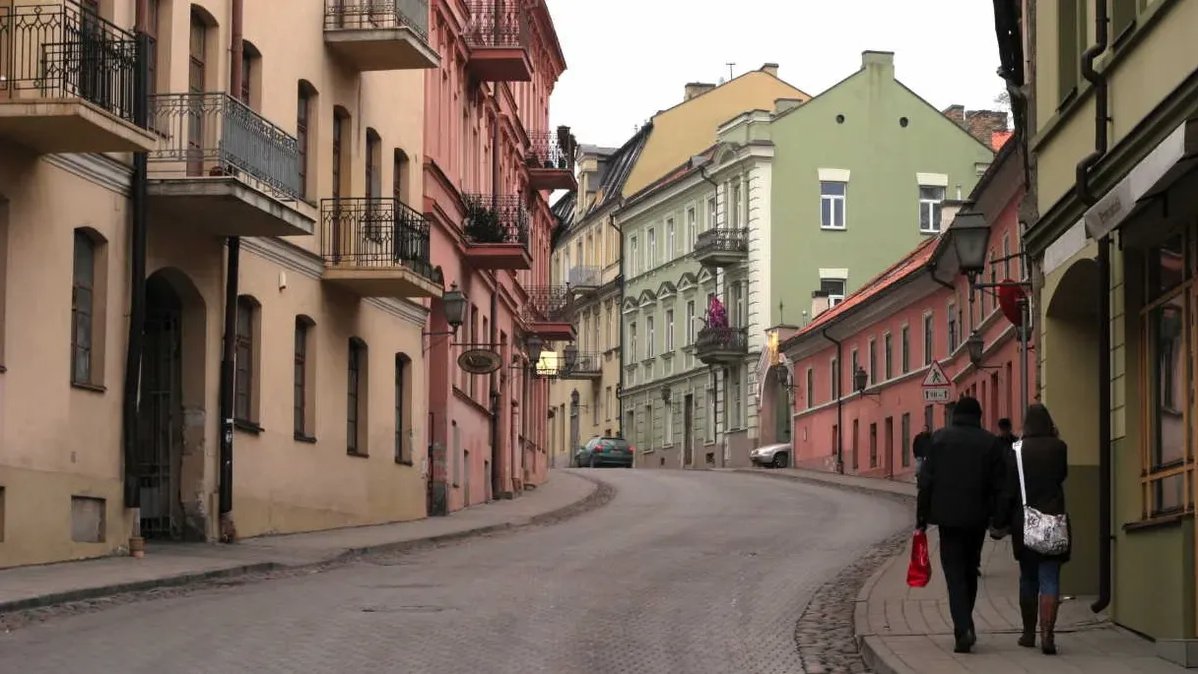Lithuania was among the first republics to secede from the USSR, and still remains one of Russia’s most hostile neighbours in Europe. In the spring of 2022, the Lithuanian parliament unanimously recognised Russia as a state sponsor of terrorism and its actions in Ukraine as genocide of the local population. In June, the Vilnius authorities supported the idea of removing the memorial to Soviet soldiers from the city cemetery.
However, in the very heart of Vilnius, there is a place free from judgment and law: Užupis, the “Republic of Angels”, of free-spirited philosophers and artists. It was all the more interesting to find out what they think about the Russian invasion on this island of freethinking.
Free people
Užupis is a stand-alone tiny universe which is, according to the locals, crossed by Axis mundi. Here, the only law is complete creative freedom and a healthy “screw it” attitude. According to the Užupis Communal Code, in everyday life, the Užupians are governed by “customary law, inspirational examples, dreams, insights, mythologies”. In 1997, this neighbourhood was proclaimed an independent “republic”, which, like any self-respecting state, has eventually provided itself with a flag, a currency, an anthem, a Constitution and other “landmarks on which infinity rests”. Romas Lileikis, a bard and film director, was elected president; ministers and ambassadors were appointed, and a parliament was formed. It includes absolutely all residents of Užupis, while parliamentary meetings most often consist of cookouts on the banks of the River Vilnelė, which is concurrently the sacred border of the Republic.
Translated from Lithuanian, “Užupis” means “town beyond the river”: it is the waters of Vilnelė that separate the district from the old city. Improvised wooden swings, mandalas and dream catchers hang under the bridges crossing the river. Its green shores are overgrown with maples, with vinyl records, open books and clay bells nailed to their trunks; on one branch, a bungee dangles above the noisy flowing water. An open piano stands right at the water’s edge, surrounded by children’s pinwheels. Nearby, overhanging the river course, there are wooden terraces of the first and most beloved local cafe, which, at the same time, represents the parliament of Užupis.
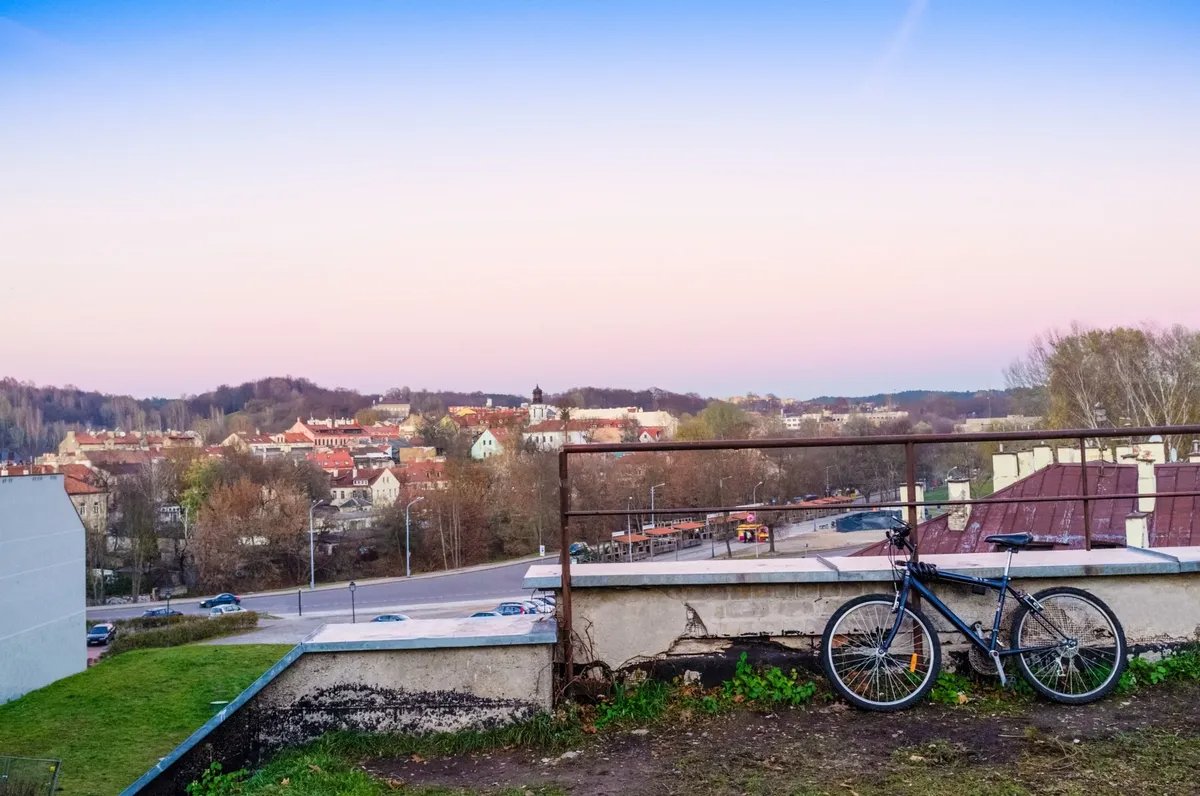
The view of Užupis. Photo: Getty Images
Here I met with one of the founding fathers of the Republic, Thomas Chepaitis, a poet, an essayist, a translator, Užupis’s Minister of Foreign Affairs and the author of the phrase: “We must make the world a big village, where legends live, where chimneys smoke and where cabbage is planted in rows under the windows.” Well, this is pretty much what the area looked like back in the late 80s and early 90s, before the Vilnius bohemia began to flock to Užupis. With the exception of self-made checkpoints deployed at the entrances to Užupis, and the fact that people from Vilnius preferred to avoid the neighbourhood.
The reason is that with the collapse of the Soviet Union, local factories, the lifeline of this originally working-class district, were closing one after another. Houses were empty and half-ruined, organised crime ran rampant.
Užupis became famous for its strong and widely shared understanding of “us and them”: people from the other side of the river were not welcome here.
“This is kind of a story of semi-criminal Vilnius,” says Thomas. “There were some shady types with guns guarding the bridge, but I had a friend among the locals, and they used to let me through. From the windows here you could hear [Soviet singer-songwriter] Vladimir Vysotsky’s songs playing all the time. The houses were warm and cosy; at home, grandmothers were making jam. My gangster friend used to say to his grandma: “Thomas came in, give him some jam. Or some cabbage soup.” Everyone here had their own gardens: you get into the backyard, take a radish and eat it right there.”
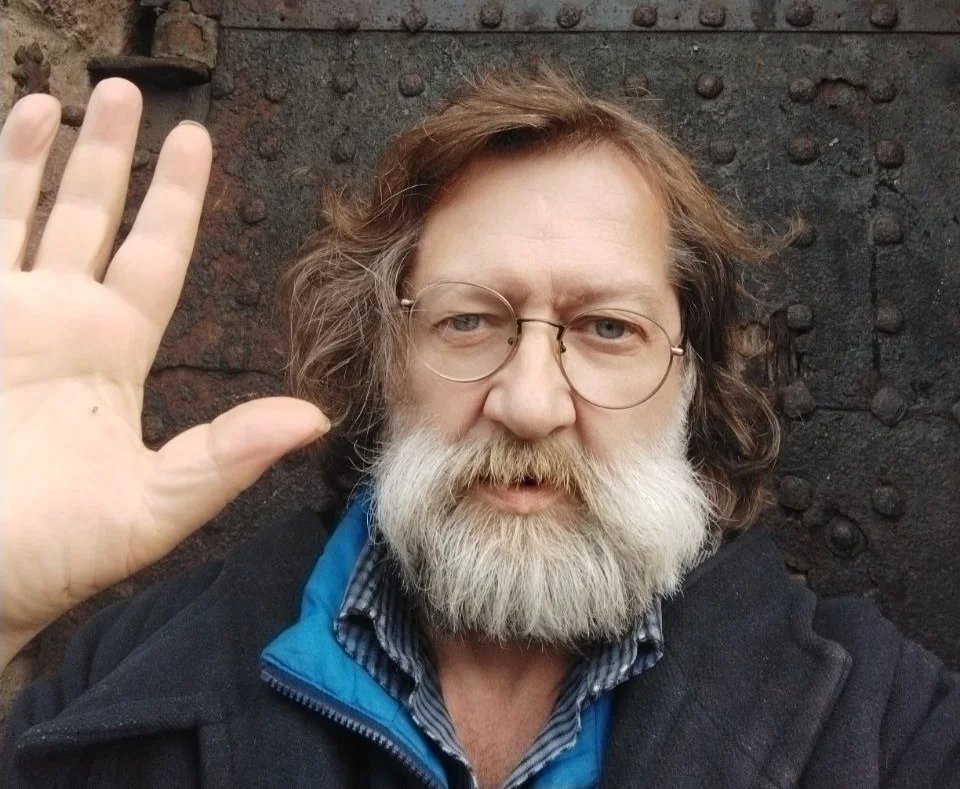
Thomas Chepaitis. Photo from the personal archive
In the 90s, musicians, filmmakers, sculptors, writers and artists began to little by little settle across the river. They bought cheap local housing, inhabited this semi-abandoned marginal area in their own creative way and gradually forced out the criminals.
“The locals, by the way, turned out to be quite good people to talk to,” Thomas says. “Well, you had to be careful so they didn’t sneak anything from you. I mean, we had a friendly relationship with them, but they still needed money for a drink. In return, they kept promising to bring you radishes from their garden. Almost everyone in Užupis did farming: some kept a goat, some a chicken. The local guys were pretty inventive.”
The city authorities pretended not to see what was happening beyond the river. When UNESCO allocated funds for the renovation of the historical centre, they painted just one house in Užupis, although the area is a rightful part of old Vilnius. Also, the reputation of it being a criminal ghetto would not leave Užupis for a while, and the police preferred to stay out of it.
“There was a fat sheriff in Užupis, a retired king of punks,” Thomas recalls. “He had a 1961 Volkswagen racing car. He wrote ‘Sheriff Užupis’ on it and let everyone drive it. Locals used to go for a ride and watch over the town, they really enjoyed it. Here, everyone knew everything about each other: this one is running down the street with stolen gasoline, that one is repainting a car. So they drove, chasing… themselves. Very inventive.”
With the arrival of the creative intelligentsia, Užupis freshened up and stepped into a new life. Many buildings were renovated, curtains and flowers appeared on the windows. Those who were once afraid to walk here alone started to come here from other parts of Vilnius.
The main thing that the new residents brought to Užupis was an endless feast. There was always something going on here: fairs, concerts, processions, fireworks, film shows, performances, carnivals or celebrations.
In Užupis, they played music on factory chimneys, danced, rang the gong, fired gunpowder, rolled giant Easter eggs down the streets, and even poured beer from the fountain in the main square.
“Every day there were lots of people, there were hundreds, if not thousands of them,” says Thomas. “I don’t know why. It must have been a kind of a free state. By that time, the state of Lithuania had been structured, and everyone got a job where they had to count zeros and ones (or maybe ship underwear to Russia). Užupis was a reaction to Lithuania which very quickly became a bureaucratic state and, in order to stop the barbarity and banditry, also a police state. While here, there was life still, happy or unhappy, but life as it is.”
Games that adults play
Apparently, this is the reason why there is no institution in Užupis that would issue or take away citizenship. In order to become an Užupian it is enough to express your desire out loud. As for the passport, you can draw it yourself: since you are one of a kind in this world, your document should be also unique.
However, you will first have to visit Užupis at least once. For example, the Dalai Lama, honorary citizen of the Republic, has visited it three times. Here, he planted an apple tree in the Tibetan Park and blessed the mosaic mandala made by a local sculptor. He also consecrated and blew away into the river a sand mandala, which the monks of the Order of the Yellow Caps had been crafting for two weeks.
The main entrance to the Užupio Res Publika is via the main bridge near the Orthodox Cathedral (this part of the city used to be called the Russian Side). Having crossed the bridge, on the ground floor of the building with the sign “border crossing point” you can put an entry stamp in your passport and change your money to the Užupis currency. It is the most stable currency in the world since, despite any global upheavals, one eurouž is always convertible into one glass of beer.
On the tiny main square I see a column, on top of which a bronze angel, one of the symbols of Užupis, blows a trumpet. Before the angel appeared here in 2002, the column was crowned with a huge egg.
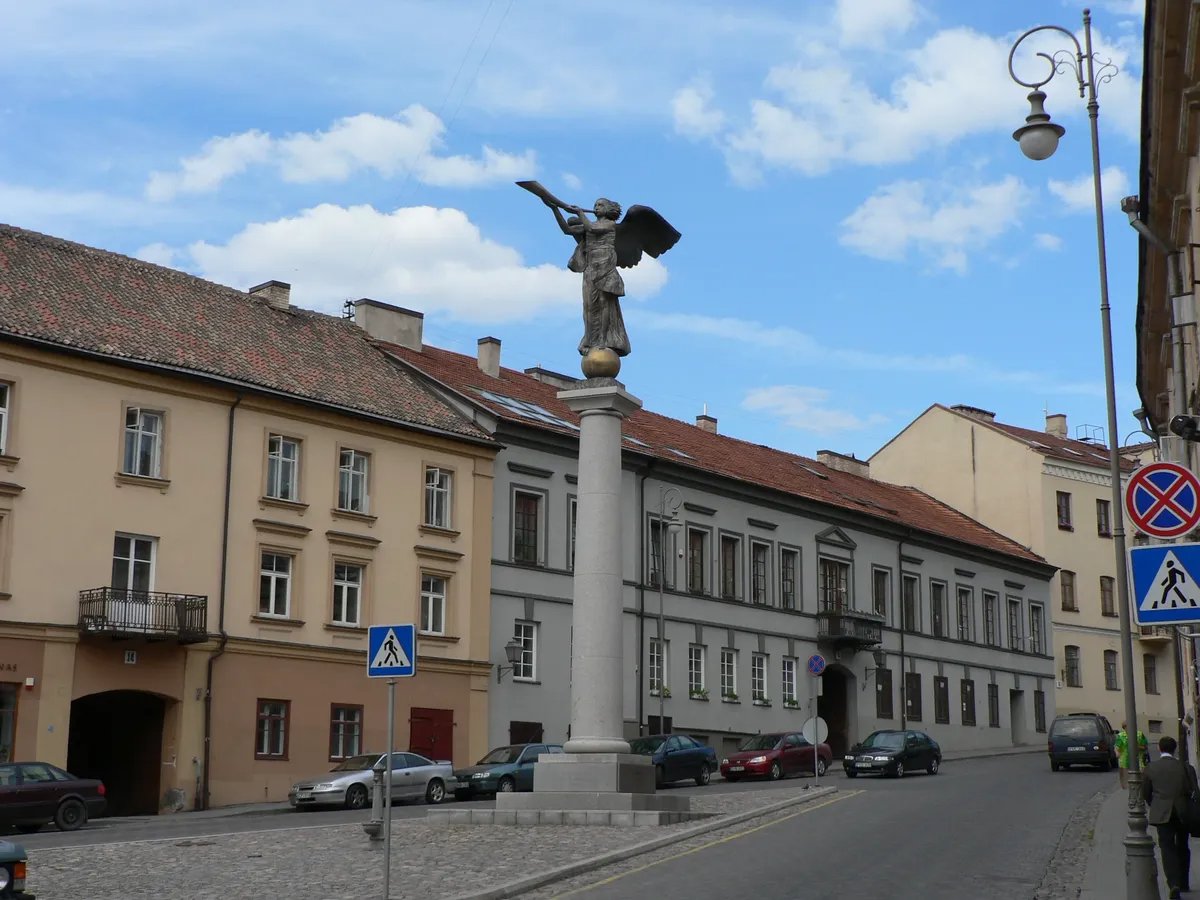
The Angel of Užupis. Photo: Wikimedia
“Why an egg?”
“Well, that’s where the angel hatched from later on,” Thomas explains. “After they put up a column it took another year to complete and polish the angel itself. So all this time the place was occupied by the egg. Many people liked it even better: the angel is way too classic. But we eventually sold the egg to another community, the community of Saint Stephen, which also developed from the ruins near the railway station. The egg is still there.”
“And why an angel?”
“Because the sculptor had a dream that he should make an angel.”
One evening after the declaration of Užupis’s independence, its President Romas Lileikis came to visit the Foreign Minister of Užupis Thomas Chepaitis. The president had no hot water at home and wanted to take a shower, but in the end, that evening, the famous Constitution of Užupis was born. It states, among other things, the right to have hot water, but also the right to love, doubt, and to realise one’s insignificance or magnificence.
Today, this Constitution translated into dozens of languages is displayed on Paupio Street, next to another famous symbol of the Republic, the holey Holy Hand, which does not allow to take bribes. Užupis keeps up with the times, so recently, the Constitution was supplemented with one more law: “Any artificial intelligence has the right to believe in the good will of mankind.”
The President of Užupis is responsible for the “wind in the flag”, of which the Republic has four: one for each season.
Although I see all of them hanging in the streets at the same time. “Maybe all the seasons do happen at the same time here?” Thomas wonders out loud.
Besides that, Užupis is a member of the Antarctic Micronational Union. By joining the union, it was hypothetically granted territory in Antarctica, which is, by the way, quite large in comparison with the Republic itself.
Hundreds of embassies and representative offices of Užupis exist all over the world and beyond. There are several embassies in Russia but the position of the Consul General, previously occupied by the artist and journalist Nikita Alekseev, is now vacant. Užupis has ambassadors of Good Taste, Survival, Rock Music, Secrets, Smile and Digital Inclusions, its embassies are open in Great Scythia, in Christiania, on Austrian-Norwegian border, in Paradise, on the Front Line and, for example, on the Streets of the World.
“Why do you need an ambassador to the Bermuda Triangle?”
“He needs to figure out what this Triangle is all about. And to maintain the energy balance there,” explains Thomas. “Though I never liked this theory that everything is energy. It kind of shortens the world a lot. It reduces all the diversity of the world and of the person (of the soul, for example) to some sort of energy flows. The energy is something active, but not everything must act. There are states such as… the night falls. Where is the energy here? There is no energy in this. There is expectation, perhaps longing, beauty. The morning has come. The day. We are sitting and talking. Something is changing. This is what is called living. But it is very difficult to live like this: now everyone is acting, doing something. Now there is a cult of energy — with its sign, a lightning. Not to say Z, pardon me. By the way, maybe these bastards do believe in energy, who knows. Maybe someone told them that there is no point in just standing with a gun doing nothing: better shoot, run somewhere, act, in a word. Ok, this is physical training, but there are some other disciplines as well.”
***
Užupis itself does not wage wars. The army that had been recruited to maintain republican independence and consisted of 11 soldiers, was soon disbanded. The fleet was also created for form’s sake: these were paper boats, which local children then launched along the river. The same river that became for the Užupians a place to arrange swimming races, to jump naked from the sauna, to make fires, to breed fish, to dry their clothes, to hold important governmental meetings, and now to display, as a sign of support, portraits of Ukrainians made during the war.
It is here, on the banks of Vilnelė river, that the citizens of Užupis celebrate the Independence Day of their Republic. It happens every year on April 1st. I forgot to ask Thomas why they chose this particular date, and I also forgot to ask him the main question about Užupis: is this all a joke?
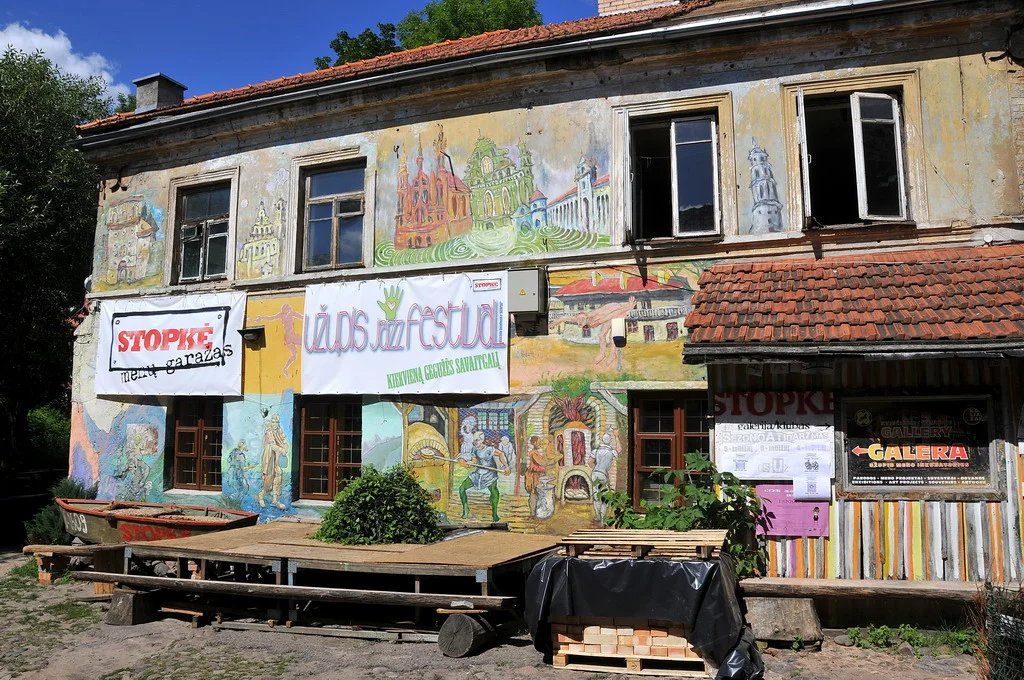
Street art. Photo: Wikimedia
***
On the importance of playing
“The one in charge of ensuring that the flags are always out, is our prime minister. But I think that now he will disappear from sight, because he is busy carrying aid to Ukraine. For him, this is more real. He already begins spitting upon Užupis, saying that these are all games. Adult games. The president tried to explain to him how playing is important. Of course, one should not cross the line, so as not to get carried away. Ours is a very funny neighbourhood, there are funny things happening here. But it is supposed to be funny! Like, in the Kremlin, there is nothing funny.”
On how Russia can learn self-irony
“Thinking less about itself, in every sense. All this ‘rebuilding Russia’ and so on… all of this is necessary and important, but it’s time to stop. And giving less advice. Already in Soviet times everyone was sick of their advice. In Russia, they should give way to playing. We have the feeling that we live in a normal, understandable world, but it is very grotesque. Without noticing the grotesque, all these angles, we lose a lot.”
On good and bad comedians
“Ukraine should be grateful that it has a president who is a comic actor. Comedy is the highest art, higher than tragedy. Comedy is supposed to have a happy or at least funny, unexpected ending. While in tragedy, we know that both Romeo and Juliet die.
What I see between Putin and Zelensky is not a relationship between Romeo and Juliet, but a relationship between a good comedian and a bad comedian, a white clown.
Zelensky is now trying to change his character, I hope he doesn’t! Not being afraid to be funny is the highest that there can be in a person. This is the first step of spiritual growth.”
On which clauses of the Užupis constitution were violated by this war
“All of them, I guess. ‘Everyone has the right to die, but this is not an obligation’, this one is definitely violated, because it has become an obligation. As for the right to ‘understand’ and ‘understand nothing’, half of us do not understand anything now. Although there are times when to understand nothing is a crime. Sometimes I look at Russian officials and think: they really do not understand! They are enjoying the right.”
On the Russian world
“Yesterday we had an exhibition opening in the courtyard, and they brought a samovar. I was so happy; I really love the samovar! And I thought: the ‘Russian world’ is not too bad, it has samovars. This is what the Russian world is about. I grew up in it, in the samovar steam. I also love children’s poems by Korney Chukovsky. And Russian country estates. I really like Russian [literary characters of] landowners like Oblomov. I love this special quietness in people. It is rare, but it is so beautiful and it reconciles with everything. These people have peace in their hearts. Quiet Russian people have the right not to accept Europe. Europe is arrogant and proud of itself. Even if, after all, it has rules and does not allow herself much and will never reach such lawlessness. But one should look for the Russian world in small things. One should search for the details, for what is funny or touching.”
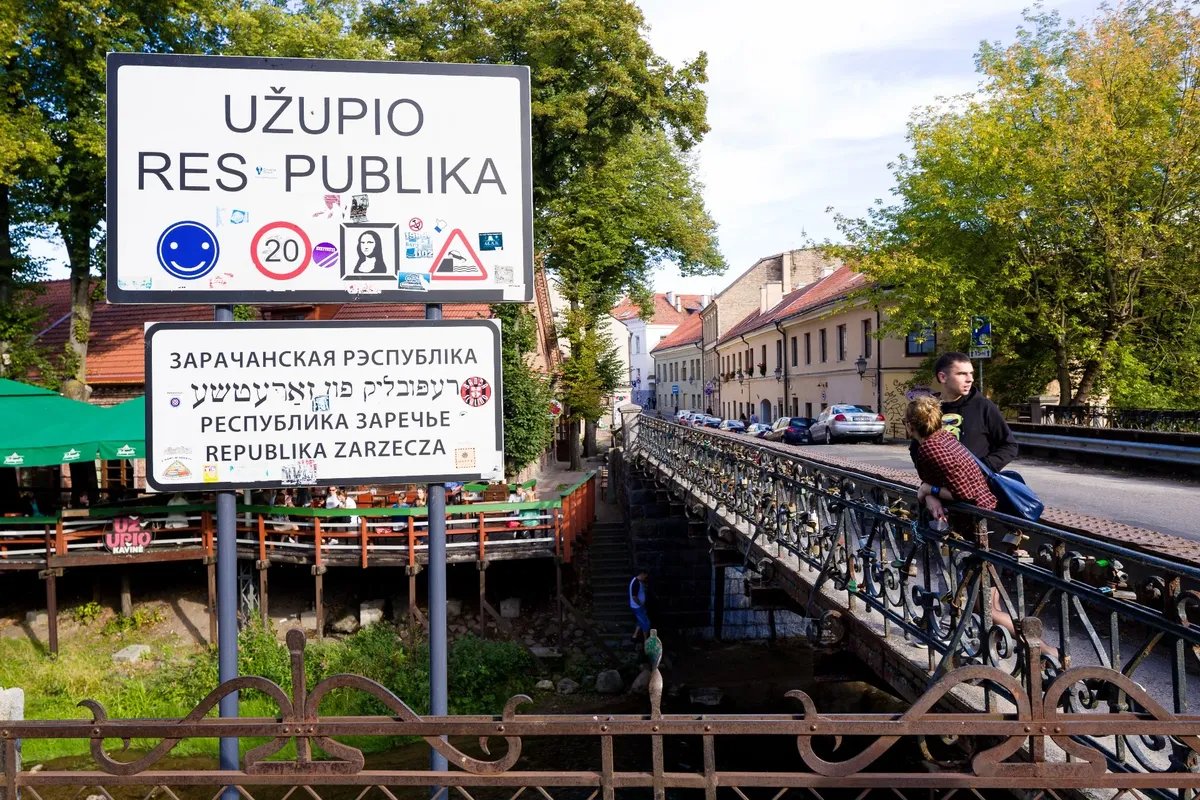
An entry sign to the Republic of Užupis. Photo: Thierry Tronnel / Corbis / Getty Images
On the search for fragility
“Russia is an empire without law. Can you live without law? Yes, you can. But then there must be some kind of ‘seasonable weather’ between people. Back in ancient times, they used to say that, in a state, there should not be more than five thousand people because in this case they can still be more or less remembered. That is why one of the main features of Užupis which makes it useful to the world, is that it is very small. As our president says, Užupis is so small that there is enough space for everyone. And what is Russia? Where is its fragility? If we catch this fragility, this little cloud, we can understand what Russia is and what to do with it. It will, of course, turn out to be much smaller than Užupis.”
On the message for the Kremlin
“I’m thinking about whether to announce something to Russia on behalf of Užupis. But since it is against our Constitution to attack anyone, I as Foreign Minister, would like to send a diplomatic note. Actually, I have already used up almost all of them. Do, Re, Mi, Fa, Sol… I will skip two of them, save them for other occasions. I would like to send to the dear Kremlin a little, quiet Si note. I imagine there are some small cracks in the old Kremlin wall. Like those in the Mausoleum, where we children used to come to warm up. I remember I once noticed there in the corner an old stink bug, which, apparently, had been sitting there since the time of the Revolution. Anyway, I would like my diplomatic note to cause a tiny irreparable damage to the dear and respected Kremlin. I don’t know how, maybe with the help of angels? There are a lot of gaps in that wall and the sound knows no walls. Let my note be in the upper octave. Let it do what it has to do and help this slightly confused… what should I call him…”
“Stink bug?”
“Stink bug. Let’s finish like this.”
Join us in rebuilding Novaya Gazeta Europe
The Russian government has banned independent media. We were forced to leave our country in order to keep doing our job, telling our readers about what is going on Russia, Ukraine and Europe.
We will continue fighting against warfare and dictatorship. We believe that freedom of speech is the most efficient antidote against tyranny. Support us financially to help us fight for peace and freedom.
By clicking the Support button, you agree to the processing of your personal data.
To cancel a regular donation, please write to [email protected]
